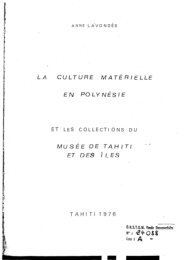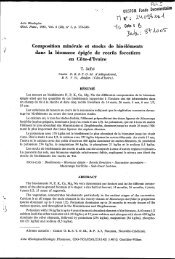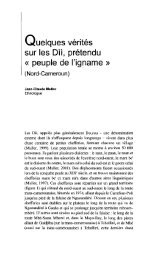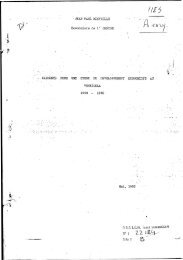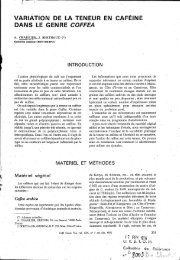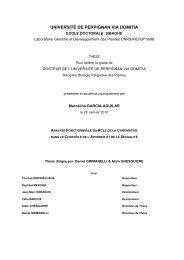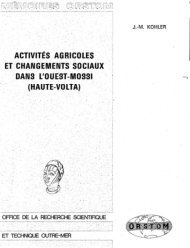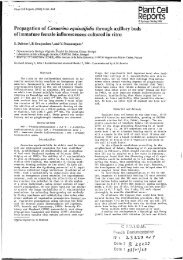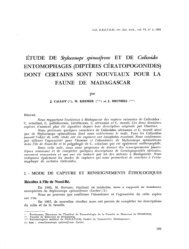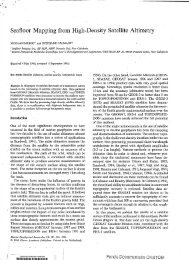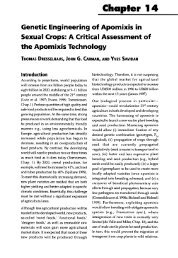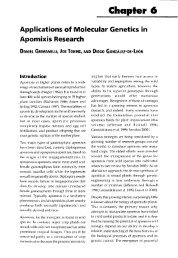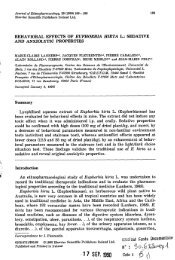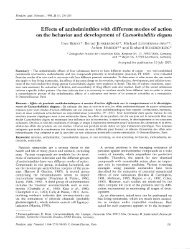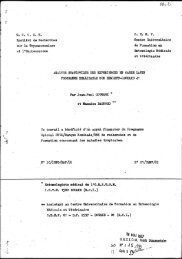A study case on coffee (Coffea arabica): Limu Coffe - IRD
A study case on coffee (Coffea arabica): Limu Coffe - IRD
A study case on coffee (Coffea arabica): Limu Coffe - IRD
You also want an ePaper? Increase the reach of your titles
YUMPU automatically turns print PDFs into web optimized ePapers that Google loves.
4.2) Agricultural practices<br />
4.2.1) State farms<br />
State farms are the more modern plantati<strong>on</strong>s and are the <strong>coffee</strong> producing units the<br />
more accurately applying agricultural practices. Some investors tend to their practices<br />
planning but generally join garden management rules. They play an important role in the<br />
woreda spreading as a model for all producing <strong>coffee</strong> units c<strong>on</strong>sidering their book of practices<br />
as a whole to reach. The <strong>Coffe</strong>e Plantati<strong>on</strong> Development Enterprise (CPDE) in charge of<br />
<strong>coffee</strong> state farms regularly publishes a <strong>coffee</strong> producti<strong>on</strong> manual. The <strong>Limu</strong> <strong>Coffe</strong>e<br />
Plantati<strong>on</strong>, a branch of the CPDE, is applying the current <strong>on</strong>e which is given in annex. But<br />
state farms and modern investors applying their practices are implied in envir<strong>on</strong>mental issues,<br />
c<strong>on</strong>cerning c<strong>on</strong>taminati<strong>on</strong> due to DAP and urea as fertilizers.<br />
4.2.2) Agro-forest <strong>coffee</strong><br />
Illustrati<strong>on</strong> 21:<br />
Suntu State Farm row<br />
organisati<strong>on</strong> of trees<br />
(Bossolasco, 1 st July 2009)<br />
As T. Stellmacher (2007) described in “Prospects and challenges of forest <strong>coffee</strong><br />
certificati<strong>on</strong> in Ethiopia” most peasants transplant <strong>coffee</strong> seedlings within the forest and slash<br />
competitor plants. In general agro-forest management intensities are minimal with low labour<br />
and almost no cash input. This <strong>coffee</strong> grows entirely organic simply because peasants can not<br />
afford pesticides, herbicides or other chemical inputs. The yields fluctuate tremendously from<br />
year to year with even no yield in some seas<strong>on</strong>s due to the natural <strong>coffee</strong> cycle, poor<br />
management and sometimes unfavourable weather c<strong>on</strong>diti<strong>on</strong>s. These figures are extremely<br />
low in comparis<strong>on</strong> to more intensively managed garden producti<strong>on</strong> or modern plantati<strong>on</strong><br />
systems. The agro-forest producti<strong>on</strong> system, or forest producti<strong>on</strong> system roughly speaking,<br />
implies c<strong>on</strong>siderable low yields and high fluctuati<strong>on</strong>s from year to year and from <strong>on</strong>e forest<br />
plot to another. The <strong>coffee</strong> cooperatives in South-western Ethiopia c<strong>on</strong>sist of around 100 to<br />
44



